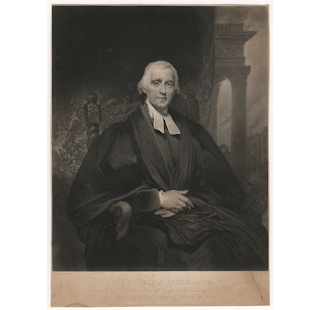"The greater and the lesser duties of life are almost always perfectly consistent": A Hackney Phalanx sermon for the Second Sunday after Trinity
From A Course of Sermons, for the Lord's Day throughout the Year, Volume II (1817) by Joseph Holden Pott - associated with the Hackney Phalanx - an extract from a sermon for the Second Sunday after Trinity. The text - "And they all, with one consent, began to make excuse" - was from the Gospel of the day, Luke 14:16-26. Pott here addresses the challenging account of the bereaved son seeking leave to bury his father. The text does not, he states in characteristic Old High fashion, encourage a "giddy zeal, which tramples upon ordinary ties", but does affirm "the greater obligation" of obedience to the Gospel:
The plea thus offered was a strong one; it was grounded upon natural affection, and was supported by the duty which a child owed to his parent, even in a moment when the sense of filial duty may be thought perhaps to bind most forcibly. Our Lord himself was no stranger to those obligations; he set forth a pattern of a just compliance with them in his own example. But in this, as in other instances, he took occasion to remind men, that there are superior ties; and that God may vindicate his own claim over every other. Compare now this excuse, with those to which the text alludes; with the proving of oxen, or the visiting a new-bought field. The weight inclines much in favour of the plea, which was made by a son, who craved leave to pay respect to the remains of a departed parent.
But attend to our Redeemer's answer: "Follow me, and let the dead bury their dead". There is no one, surely, who can think that our Redeemer would debar this man from the performance of a natural duty to a parent, without some great and necessary reason. Our Lord could read the heart. He saw perhaps that this excuse, though it were better coloured, was similar to those which are recorded in the parable. There might be other sons at home who were less disposed to embrace the word of life, than this son was; and to them our Lord might leave the funeral office. Or he, who knew all things, and needed not that any should teach him what it was best for them to do, might perhaps perceive the danger which this person would encounter, if he should go back even for that worthy purpose. He might have incurred the loss of everlasting life, by returning at that time to take charge of the dead. By forfeiting the benefit of instruction in this first stage of his conversion, he might have returned to his former habits, or have fallen altogether from the faith.
But if no more were designed by our Lord in that reply, than merely to demonstrate in one striking instance, that the greater duty was to take place of the less, where both could not be fulfilled; if men were to be taught by this example in all ages, that the steps of faith are not to be kept back, in some cases of superior obligation, by the calls of ordinary duty and affection; the motive and the reason were abundantly sufficient to justify our Lord's reply, and to vindicate its wisdom and propriety. Such cases rarely happen; the greater and the lesser duties of life are almost always perfectly consistent; and the giddy zeal, which tramples upon ordinary ties, will find no support from this example. But where a competition happens, the greater obligation must prevail.



Comments
Post a Comment